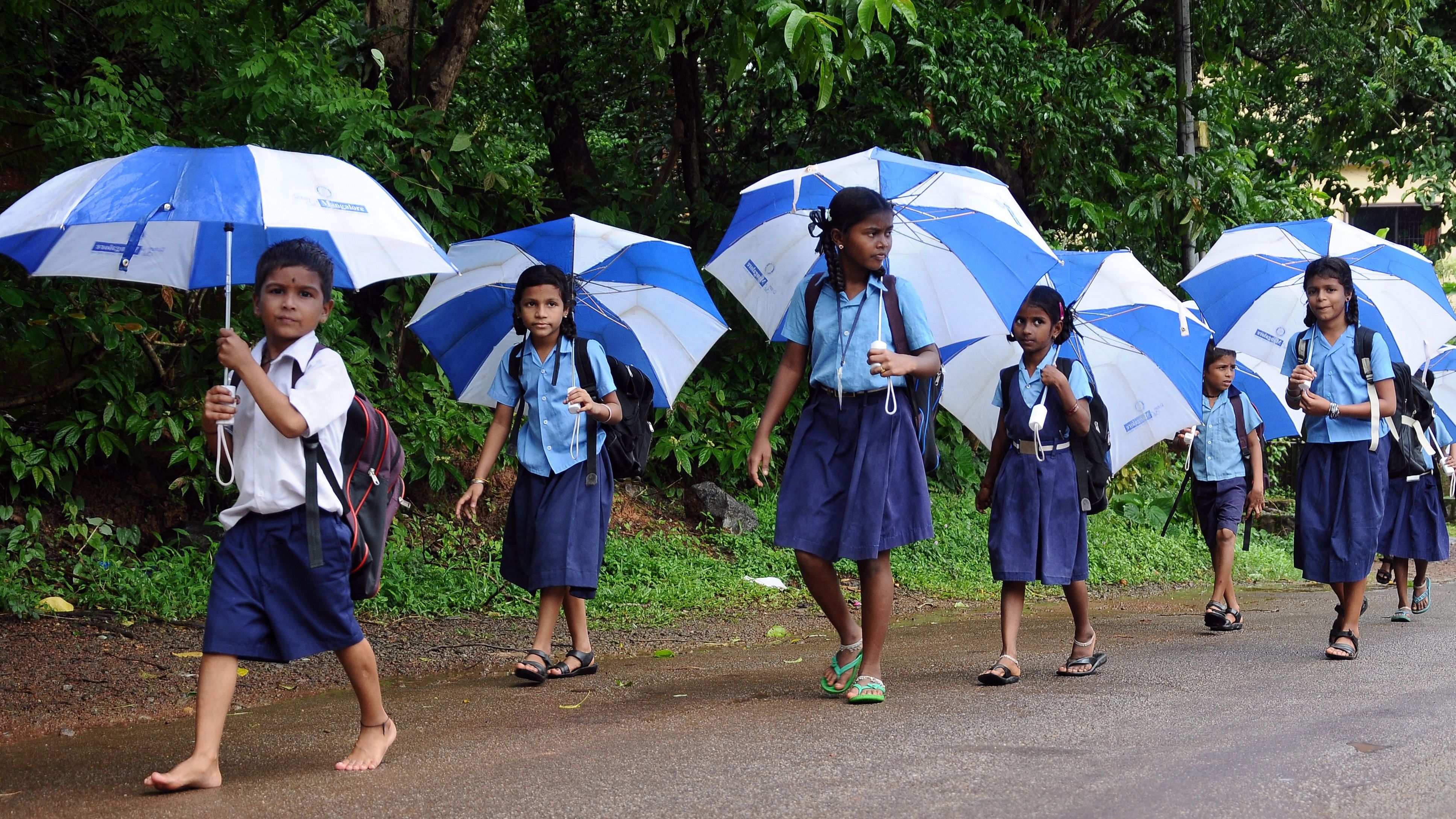
Children walking to a government school that teaches Tulu.
Credit: DH Photo
While there is a surge of activism around promoting and preserving Kannada, native dialects and languages like Tulu, Arebhashe, Kodava and Konkani may not even have teachers to pass on the languages to a new generation. Tulu teachers in Dakshina Kannada and Udupi districts, for instance, may soon stop teaching after not being paid honorariums for more than a year.
The honorarium amount for 40 Tulu language teachers in Dakshina Kannada and Udupi districts has not been credited since the pandemic. “The Karnataka Tulu Sahitya Academy (KTSA) needs funds to the tune of Rs 27.60 lakh to clear the honorariums of teachers pending since 2020,” says registrar in-charge of KTSA, Manohar Kamath.
“If I do not receive my honorarium, I will quit teaching Tulu from the next academic year,” says a teacher from a government school in Belthangady taluk.
The delay in clearing honorariums has hurt a local campaign to encourage more students to learn Tulu and ensure that the language gets recognition under the eighth schedule of the Constitution. The number of schools teaching Tulu, which was around 43, has decreased to 35. The academy’s efforts towards promoting the language yielded results in 2009 after the government permitted teaching Tulu as a third language starting from Class 6. Among the 35 schools, 32 schools recorded zero admissions in the sixth standard this year.
Many students opt to learn Tulu as a third language. “Looking at the students’ interest in learning the language, we continue to teach Tulu,” says a teacher from an aided school in Mangaluru. Many teachers have continued teaching Tulu even though they have not been compensated for their time.
Former president of KTSA Dayanand G Kathalsar says that initially schools development monitoring committees (SDMCs) were entrusted with the task of paying honorariums. “As the government had increased its allocation of grants, the academy began to release honorariums to teachers. Post Covid, the grants were reduced, making it difficult to release the honorarium,” he says.
MLC K Harish Kumar, who raised the issue of pending honorariums in the form of an unstarred question in the Legislative Council recently, was informed that the finance department had taken steps to release grants.
“This year, seven out of 28 students in Class 10 will be writing Tulu examinations at our school in Mangaluru. The number of students opting for Tulu language in Class 8 is zero from this academic year onwards. The Tulu teacher is set to retire this year,” says a teacher at Pompei Kannada-medium school in Mangaluru. A few years ago, as many as 20 students from the school used to write Tulu examinations.
The case of Konkani
The number of Konkani speakers stands at around 22.6 lakh, according to the 2011 census. Konkani is also being taught as a third language in schools in Dakshina Kannada, Uttara Kannada and Udupi districts. The language is, however, taught only in private schools.
For the past ten years, Vishwa Konkani Kendra, a non-government organisation, has been releasing honorariums to teachers in 12 schools. In a decade, 4,000 students have studied Konkani as their third language.
Kodava and Arebashe
The number of Kodava speakers is around 1.1 lakh, according to the 2011 census. As many as 155 students in six schools have been learning Kodava as a third language. The textbooks, `Kodava Patha Padipu’, given to students are provided by the Karnataka Kodava Sahitya Academy. The academy pays Rs 200 per hour to teachers teaching Kodava in schools and Rs 300 to lecturers in degree colleges. The academy also offers a postgraduate diploma course in Kodava.
The number of people who speak Arebashe is around five lakh, according to sources in the Karnataka Arebashe Samskruthi Mathu Sahitya Academy. “Due to insufficient funds, the academy could not conduct many activities. We had attempted to introduce Arebashe as a language in KSS college in Subrahmanya and in schools,” says Lakshminarayan Kajegadde, former president of the Academy.
However, insufficient funds hampered the process, and the government is yet to appoint a new president to the academies, sources add.
Other efforts
Leaders, including former MLA Mohiuddin Bava, launched a registered letter campaign from January 29 onwards, urging the government to declare Tulu as the second official language in Karnataka. This is the third postcard campaign in recent times. “So far 7,000 registered letters have been sent to the chief minister and the prime minister. Over 18 lakh people speak Tulu. The language needs to be included in the eighth schedule of the Constitution,” Bava says.
The Tulu lipi.
Credit: DH Photo